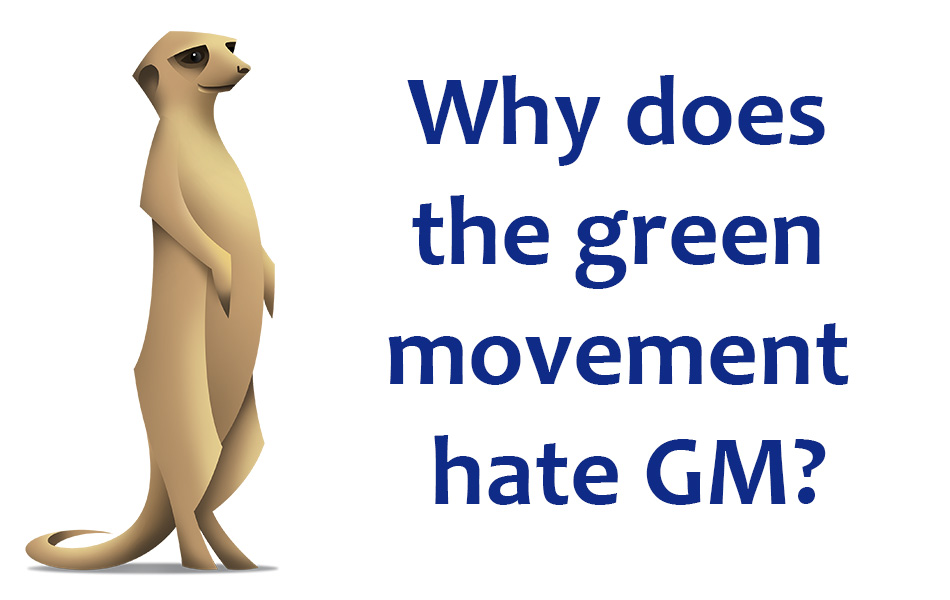This month, my friend James has written a brilliant piece exploring and (largely) debunking a lot of the common fears and complaints about genetically modified plants and crops. One of the reasons I asked him to write something on this topic is because it’s something I hear asked a lot. But it is also a topic that people seem to lump in with the general ‘green’ environmental movement – many organisations and individuals who describe themselves as being environmentalists also advocate the banning of GM products. Which seems very strange to me because as a biologist, I’ve never seen anything wrong with the concept of GM.
Don’t get me wrong, each and every GMO needs to be carefully tested to ensure that it doesn’t pose a risk to health, or to the environment. Just like every medicine needs testing before it can be licensed for use. Genetic modification is just the tool used to produce novel organisms, and that’s not to say every single one is by definition safe. But we don’t abandon the whole concept of medicine just because some drugs that were initially promising turn out to be harmful. We just ban that individual drug, compound or process and move on. So the idea that genetic modification as a concept can be morally wrong, dangerous or unethical, baffles me.
As James explains in his excellent blog post, and as I have discussed before in my rants about the overblown concept of ‘natural’, humans have been modifying organisms for centuries. At first inadvertently through selective breeding in domestication and agriculture, and most recently through techniques that accelerate evolution, such as using radiation to produce an array of new mutant plants to screen for useful traits.
Only in the last four decades or so have we started more actively modifying the genes of organisms, by adding DNA from one organism into another. But these are all just incremental steps along the same trajectory. While there’s no doubt that CRISPR has been a game-changer, we’re not exactly in unchartered territory here.
As James outlines in his post, GMOs can have a lot of environmental benefits, such as reducing pesticide use and greenhouse gas emissions, or creating disease-resistant crops, as well as societal benefits like improved nutrition or the preservation of local varieties.
So why does the green movement largely advocate for the banning of GMOs? How did GM get wrapped up in the same packaging as the fossil fuel industry, nuclear energy, or extreme industrialised agriculture?
I’m not the first to point out that many ‘green’ NGOs, lobbying groups and political parties frequently take positions, for example on embryonic stem cell research or GM crops, that are not exactly based on the scientific consensus.
Some have argued that the source of disagreement over the safety of technologies like GMO is really about our capacity, as humans, to evaluate risk. Science says these technologies are safe because we have tested them extensively for every possible harm or danger we can think of, and found nothing. But to some people the question is – what about what we haven’t thought of? There has and will always be fear and scepticism of the ‘new’. And perhaps rightly so.
Certainly, many people feel that with some new technologies the potential unanticipated risks simply aren’t worth it. Where each person draws that line will always be very personal. But given the potential benefits of GM crops, I would argue we can’t afford to be this cautious when we are experiencing an environmental crisis.
Does it matter?
I think it does matter. Partly because we need to support any (thoroughly tested) technology that can help us develop a more sustainable society, and partly because it sends a confusing message if those advocating evidence-based decision-making on the issue of climate change are also advocating unscientific positions in other areas.
As Robert Wilson wrote in the Guardian in 2013,
“Environmentalists who say we should accept the scientific consensus on climate change while telling us to ignore it on other issues are the people who are playing into the hands of those who oppose action on climate change”
Robert Wilson (2013) The green movement is not pro-science
I’d love to hear your thoughts on this – does GM make you feel excited or uneasy? If so, why?
Do you think the potential for unanticipated risks are worth it for the potential benefits?
Want to know more?
- Wilson (2013) The green movement is not pro-science. The Guardian
- McKie (2013) After 30 years, is a GM food breakthrough finally here? The Guardian
- Kloor (2012) Is environmentalism anti-science? Discovery Magazine
- Pearce (2012) Why Are Environmentalists Taking Anti-Science Positions? Yale 360
- Chapman (2011) Like scientists, greens are children of the Enlightenment The Guardian.
- Trewavas, A. J., & Leaver, C. J. (2001). Is opposition to GM crops science or politics? An investigation into the arguments that GM crops pose a particular threat to the environment. EMBO reports, 2(6), 455-459.
This post is available for early view by patrons. It becomes public at 2:00pm on Sunday December 15th, 2019.





